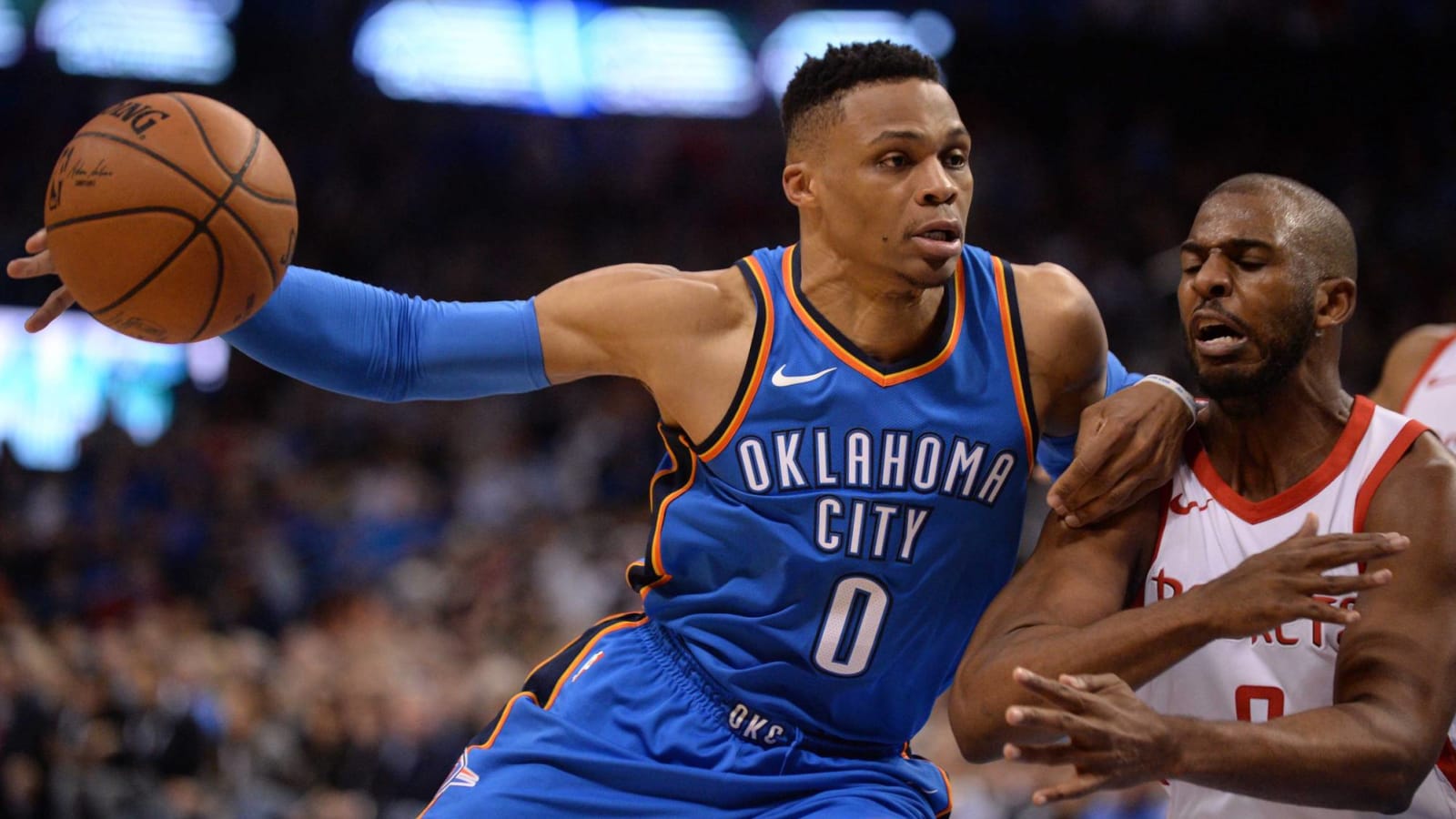
Why mega-trade for Russell Westbrook is a huge gamble for Rockets
In their second apocalyptic roster move of the week, the Oklahoma City Thunder traded Russell Westbrook to the Houston Rockets for Chris Paul, reuniting Westbrook with his old Thunder teammate James Harden and closing the book on the OKC almost-dynasty. The move was simple for the Thunder: Cut bait on a team that was no longer a contender — and not even a playoff team after dealing Paul George. They collected their eighth(!) future first-round pick of the week and are already working on rerouting Paul and his massive contract to a new team. But for the Rockets, this is a huge roll of the dice, when the odds aren’t necessarily in their favor.
First, the positives. Russell Westbrook, 30, is significantly younger, healthier and more athletic than 34-year-old Chris Paul, who’s missed more than 20 games in each of the past three seasons. Westbrook won the MVP, the scoring title and averaged a triple-double just two years ago. He makes the same amount of money as Paul, though his deal runs one additional year, when he’ll be making $47 million at age 33. Westbrook and Harden have a history of success together, reaching the NBA Finals in 2012 alongside Kevin Durant. They draw a tremendous amount of fouls, with 600 combined last season. (Paul drew 42.) And Westbrook tends to play his best when motivated by revenge or perceived slights. Witness his MVP campaign after Durant’s departure from OKC or when he won All-Star MVP in 2015 after being snubbed as a starter. Imagine the intensity if the Rockets match up with George’s Clippers in the playoffs!
The downside is that Harden and Westbrook have similar strengths and weaknesses. Both rack up triple-doubles, rebound well from the guard position and get lots of assists. (Westbrook led the league last season, and Harden was seventh.) They’re great at getting to the basket, and they score at a high rate when they get there — Harden made 60 percent of his shots within three feet, and Westbrook was at a career-high 65 percent. But both tend to fall asleep on defense, they’ll shoot their teams out of games in the playoffs and they’re more comfortable initiating the offense themselves. Westbrook is far more erratic than Paul, but his highs are higher and his lows are lower.
Houston’s motivation might not be adding Westbrook as much as it is subtracting Paul. Though Paul and general manager Daryl Morey both denied that Paul’s relationship with Harden was “unsalvageable,” this deal indicates that CP3's reported trade demand and Harden’s “Trade Chris Paul” demand were real. And there were few teams that could handle Paul's giant salary, particularly with seemingly half the league hard-capped after last week. Playing with Paul seems exhausting, with his constant haranguing of the referees, opponents, coaches and his own teammates. It should make the Rockets much more watchable since they’ll only have one guard flopping all over the court trying to draw fouls instead of two.
Despite their big assist totals, Harden and Paul didn't pass to each other — 87 percent and 86.1 percent of their shots were unassisted, respectively, as opposed to Westbrook’s still-high 74.8 percent. Harden will likely take turns with Westbrook more readily than with Paul, which should drive down his gaudy statistics. He’ll likely never win another MVP trophy or star in another State Farm commercial, but he should have more energy in May. Westbrook shoots far worse than Paul, particularly from three, so Houston must hope that more spacing will help his accuracy, and the Mike D’Antoni system will cure his addiction to long twos (35.8 percent of his shots, as opposed to Harden’s 1.8 percent). The dream scenario is Westbrook attacking closeouts by driving past defenders (something Paul can’t do anymore) and hitting open Rockets on the perimeter. The nightmare scenario is Westbrook launching a series of 20-footers five seconds into the shot clock, and he and Harden giving up open threes and backdoor cuts for layups.
The Rockets may have felt like they had no choice but to move Paul, but it’s a huge gamble. Even with all the talent moving to Los Angeles, FiveThirtyEight.com had Houston as easily the top regular-season team in the West before the trade. Westbrook is going to contribute more during the regular season, but at least on paper, Paul’s defense, shooting and ball security (best assist-to-turnover ratio in NBA history) are more valuable in the playoffs. But that assumes Paul is healthy during the playoffs, or that last year’s struggles weren’t the beginning of a steep decline.
Ultimately, the trade comes down to Houston’s fear of the Paul-Harden feud escalating — and of paying a 36-year-old Paul $44 million in 2021-22. Is that worth two future first-rounders and two pick swaps? If Houston can finally get over the playoff hump and make the Finals, it absolutely is. And if the Rockets don’t, Morey’s probably not going to be the Houston GM once the trade bill comes due.
More must-reads:
- Blockbuster: Thunder trade Russell Westbrook to Rockets for Chris Paul, draft picks
- Report: James Harden wanted to team with Russell Westbrook
- The 'NBA Slam Dunk Contest winners' quiz
Breaking News
Customize Your Newsletter
 +
+
Get the latest news and rumors, customized to your favorite sports and teams. Emailed daily. Always free!

